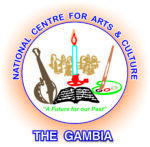ABOUT NCAC
![]()
The National Centre for Arts and Culture (NCAC) is a semi- autonomous institution established by an Act of Parliament in December 1989 to preserve, promote and develop Gambian arts and culture. The 1989 Act is now superseded by the NCAC Act of 2003. The NCAC Act inter-alia provides for a governing board of eight members to control the management, property, business and funds of the Centre. The President appoints the members of the board who are not ex-officio on the recommendation of the Minister responsible for the administration of the Act (Minister of Tourism and Culture), including the Chairman of the Board. The ex-officio members are: the Permanent Secretary, Ministry of Tourism and Culture; the Permanent Secretary Ministry of Basic and Secondary Education; the Director General of the Gambia Radio and Television Services; and the Director General of the Centre.
The day to day running of the Centre is administered by a Director General, who co-ordinates the work of the various professional departments under the purview of the Centre.
The functions of the Centre are
![]()
To advise the Minister on matters of policy relating to Arts and Culture and in particular on matters relating to national languages, the creative and performing arts, monuments and relics, research and documentation, science and indigenous technology, and sports and recreation.
promote and develop Gambian arts and culture.
implement, monitor, co-ordinate and evaluate artistic and cultural programmes in The Gambia.
promote artistic and cultural co-operation at regional and international levels.
encourage, at the local level, the emergence of groups and institutions interested in the promotion of arts and culture.
supervise the functioning of the committees that may be established under this Act.
investigate and report on artistic and cultural matters relating to research, information processing, storage, documentation, retrieval, and dissemination.
equip, maintain and manage the National Museums.
establish, equip, maintain and manage such other museums as it thinks fit.
preserve, repair or restore any ethnographical article which it considers to be of national importance.
when required by the Secretary of State, investigate and report on any matter relating to any ethnographical article.
keep a register of all ethnographical articles which it acquires or which are brought to its notice.
list all monuments whose proclamation as National Monuments it considers desirable, ascertain their owners, before recommending to the Secretary of State to proclaim them as National Monuments.
perform such functions as may be conferred on it under any law on copyright.
perform such duties as are related to the research and development of arts and culture in The Gambia.
In addition, the NCAC is charged with the administration of the Gambia Copyright Act, 2004. The Copyright Act mandates the establishment of a Copyright Office under the Centre and an independent body called the Gambia Collecting Society charged with the collection and distribution of royalties on behalf of rights holders.
The NCAC executes its mandate through three technical Departments, namely: The Directorate of Cultural Heritage, The Directorate of Literature Performing and Fine Arts, and The Directorate of Copyright; with the Office of the Director General serving a coordinating role between the departments, as well as managing finance, administration, public relations and international cultural cooperation.
Office of the Director General
The Director General is appointed by the President of the Republic on the recommendation of Board of Directors and the Minister in charge of administering the Act. As Chief Executive Officer, the Director General is responsible for the execution of policy, the day-to-day transactions of the Centre, and supervision and control over the acts of all employees. The Director General is the main technical adviser of the Minister and the Board on policy and management of projects and programmes.
He/she supervises, monitors and coordinates the operations of the Accounting and Administration office while providing the necessary administrative, managerial and advisory backstopping to the professional departments.
Other bodies under the Supervision of the Director General are:
- Finance & Administration
- Bilateral & International Relations
- Internships
Internship
The NCAC accommodates both national and foreign interns interested in familiarising themselves with the work of the institution, with specialty in any area within the competence of its existing staff. Intending interns are required to apply one-month before their targeted dates so that suitable arrangements can be made for a rewarding experience.
